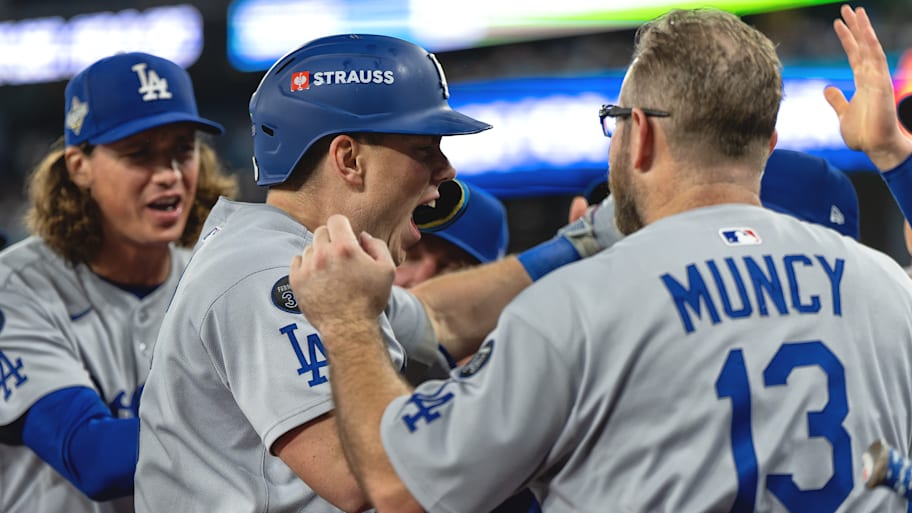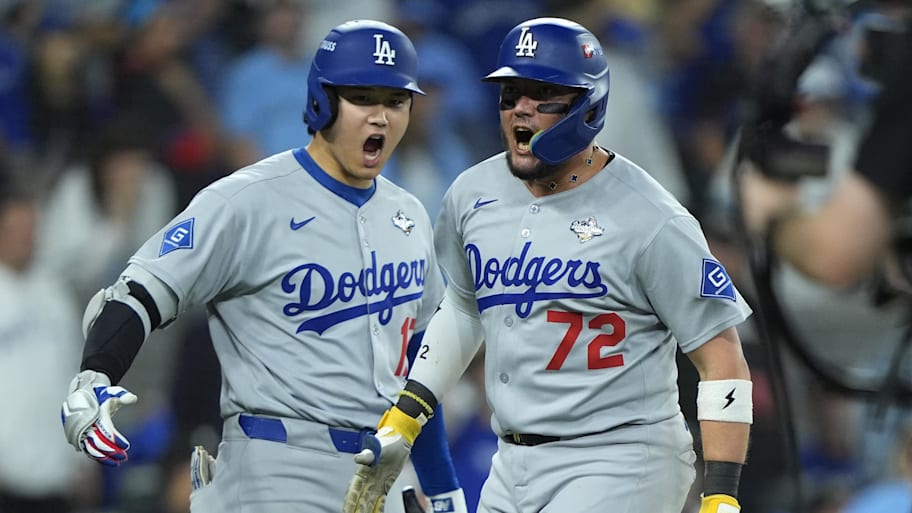
TORONTO — When it was over, when after 162 regular-season games and another 15 in the playoffs and now two excruciating innings, the Dodgers won Game 7, 5–4, to repeat as World Series champions, the man who won the game raced to the mound to grab the man who saved it.
It was Will Smith, the catcher, who launched the 11th-inning home run that stunned the sellout crowd of 44,713 at the Rogers Centre and gave the Dodgers their first lead of the night. But it was Yoshinobu Yamamoto, the Game 6 starter who got eight outs in Game 7 on no days’ rest, who gave him the chance. Twenty-five hours after he threw 96 pitches in Game 6, an outing that followed back-to-back complete games, Yamamoto all but forced his way into the game and threw 34 devastating pitches.
Manager Dave Roberts had tried not to use him at all, and then he tried to remove him after his second inning on Saturday. “Daijoubu,” Yamamoto said. I’m O.K.
“It’s unheard of,” said Roberts, who struggled to explain how Yamamoto could possibly have done this. “I think that there’s a mind component, there’s a delivery, which is a flawless delivery, and there’s just an unwavering will. I just haven’t seen it [elsewhere]. I really haven’t.”
So the manager let him go back out and close the door for a team that just kept propping it open. The Blue Jays were two outs away from ending a 32-year World Series drought when an unlikely hero emerged. In a game that featured Shohei Ohtani, Mookie Betts, Freddie Freeman and Vladimir Guerrero Jr., it was Dodgers glove-first second baseman Miguel Rojas, playing in his second game in three weeks, who lined a solo home run over the left field wall to tie the game.
MIGUEL ROJAS TIE GAME! #WORLDSERIES pic.twitter.com/1hDBIhVLS8
— Los Angeles Dodgers (@Dodgers) November 2, 2025
Each team loaded the bases with one out—the Blue Jays in the bottom of the ninth, the Dodgers in the top of the 10th—and failed to score. Smith, dragging himself around the field after catching all 72 innings of this epic World Series, dragged the Dodgers ahead.
THE FRESH PRINCE! #WORLDSERIES pic.twitter.com/ty8zLuOisJ
— Los Angeles Dodgers (@Dodgers) November 2, 2025
It almost wasn’t enough. Guerrero, the face of a franchise and the face of a nation, doubled to lead off the bottom of the 11th. Isiah Kiner-Falefa sacrificed him to third. Addison Barger worked a walk. But Yamamoto broke Alejandro Kirk’s bat with one of his signature splitters, and Betts, the shortstop snagged the easy chopper, stepped on second base and fired to first for the double play. The Dodgers, who became the first team since the 2000 Yankees to repeat, were on the field almost before the Blue Jays understood what had just happened to them.
Smith tackled Yamamoto from behind. Their teammates raced in from the dugout and the bullpen to join them. They jumped up and down on exhausted legs and hugged one another with spent arms and screamed with hoarse throats.
Of course this World Series came down to extra innings in Game 7. It could not be contained by the laws of physics, the columns of scorebooks or even, at times, by the customs of human decency. At one point in Game 7, the only daylight between the teams came when the umpires pushed the players apart. Counting the 18-inning Game 3, this was the first Fall Classic that featured more than eight games’ worth of baseball. Only three of the games were truly close—Games 1, 2, 4 and 5 were decided by an average of five runs—but neither team ever seemed overmatched.
Still this one was loopier than most. The Dodgers used all four of their World Series starting pitchers, two—Yamamoto and Tyler Glasnow—on no days’ rest. The Blue Jays used three of theirs. The fourth, Kevin Gausman, said he would have been available had the game continued.
And for a while it appeared it might go forever. The Blue Jays never seemed to go away. Twice the Dodgers won in what should have been backbreaking fashion—the 18-inning Game 3, and then the wild double play to snuff out a rally in Game 6—but Toronto just kept fighting. It won Game 4, and it nearly won this one.
Los Angeles’s roster boasts 44 All-Star Game appearances and 22 World Series rings. For the Blue Jays, those figures are 29 and three. The Dodgers’ record $328 million payroll has made some observers question whether they are ruining baseball. The Blue Jays were not interested in narratives, just in wins.

Game 7 pitted two Hall of Famers against one another, one who had been preparing for this start all series and one who learned for sure he would get it after Game 6.
When manager John Schneider told Max Scherzer he would start Game 3, Scherzer said, “O.K., so 3 and 7.” The assignment made him, at 41 years and 97 days, the oldest pitcher to start a winner-take-all World Series game. When Schneider walked by him after Game 6, which the Blue Jays lost on a brutal game-ending double play, he said, Scherzer looked “ready to kill somebody.” Schneider added, “So you trust him to be ready for this environment.”
The Dodgers trust Shohei Ohtani as well, although they were not sure what to expect from him. After Game 6, they reviewed their options. Glasnow, the Game 3 starter, had gotten the final three outs that night. Blake Snell, who started Games 1 and 5, would be on short rest; Yamamoto, who started Games 2 and 6, would be on even shorter rest. Despite playing 18 innings—and reaching base a postseason record nine times—in Game 3, then receiving IV fluids and pitching six innings 17 hours later in Game 4, Ohtani assured them that he was available on the mound for Game 6. (This is a man who, offered the chance to come out of Game 3 in the 11th due to leg cramps that had him hobbling around the bases, declined, and who, asked in the sixth inning of Game 4 how many more frames he could go, said three.)
He might have been a more traditional option in relief. But there is nothing traditional about Ohtani. The Dodgers chose to start him largely because of the rule that allows him to remain in the game as the DH once he comes off the mound—but only if he starts the game. If he relieves, when he exits as a hitter, he exits as a pitcher. Between that regulation and the logistical nightmare of getting him to the bullpen to warm up in between at-bats, this pathway was the obvious choice. But Ohtani, still recovering from surgery to repair his left elbow, had only started on three days’ rest once in his career, and that came when rain cut the first outing to two innings and 30 pitches.
“This is Game 7,” Roberts said. “There’s a lot of things that people haven’t done, and you’ve just got to trust your players and try to win a baseball game.”
Ohtani opened the game with a single, took second on a grounder to first and took third on a deep fly ball to center field. Betts grounded out to end the frame, which gave Ohtani two and a half minutes to dart into the dugout, remove his batting armor, grab his glove, huddle with pitching coach Mark Prior and bench coach Danny Lehman, and take the mound for his six warm-up pitches. Just under five minutes—and, it must be said, two and a half minutes after the rules stipulate—after he ran out Betts’s grounder, Ohtani threw ball one to George Springer. Springer, visibly wincing on every swing as he managed a right-side injury that cost him two games, singled but was retired on a strike-’im-out-throw-’im-out double play to end the inning.
Ohtani caught a break in the second inning. His secondary command was spotty, so he had to lean on his fastball. He walked Bo Bichette to lead off the frame and allowed a single to Addison Barger. With two outs, Ernie Clement knocked a single to right field, but the hobbled Bichette had to hold at third. Andrés Giménez waved at an inside fastball to end the threat.
Springer led off the next inning with another single. When Nathan Lukes bunted him over and he took third on a wild pitch, the Dodgers elected to walk Guerrero intentionally. That brought up Bichette. The first pitch he saw was a slider that slid right into the middle of the zone. As 44,713 roaring fans shook the Rogers Centre, Springer and Guerrero each raised their hands and jogged home. Bichette slowly limped after them.
BO WANTS NOISE 🗣️
— Toronto Blue Jays (@BlueJays) November 2, 2025
HIS FIRST #WORLDSERIES HOMER! pic.twitter.com/HYASfMGE0A
Bichette knew he would be a free agent after the World Series ended. He knew aggravating the injury could hurt his long-term earning potential. He did not care. “It’s the World Series,” he said. “So none of that stuff really matters.”
The homer ended Ohtani’s night on the mound after 2 ⅓ innings pitched. The Dodgers manufactured a run in the top of the fourth. In the bottom of the inning, 194-pound floppy-haired lefty Justin Wrobleski buzzed 5’ 11” shortstop Andrés Giménez with an inside fastball. On the next pitch, he hit him. The benches—and the bullpens—cleared. The umpires issued warnings. The Dodgers scored another run in the top of the sixth; the Blue Jays did the same in the bottom of the frame. With his sixth-inning single, Clement set a record with his 10th multi-hit game this postseason; with his eighth-inning double, he set a record with his 30th hit.
To cap one of the finest offensive postseasons of all time—he had more hits this postseason (28) than swings and misses (25) and more homers (eight) than strikeouts (seven)—Guerrero dazzled with his glove. He made a diving stop and flipped to first in the first; snared a rope just beyond the foul line to end the fourth; and started a nifty double play to end the seventh. He roared after each one as if he’d hit the game-winning homer.
Both pitching staffs were topsy-turvy after such a grind of a series. Snell got four outs. The Blue Jays threw Louis Varland, presumably pitching in long sleeves to keep his right arm attached to his body, who set a postseason record by appearing in his 15th game (Toronto played 18); Chris Bassitt, the starter turned relief ace; and Trey Yesavage, the 22-year-old pitching on two days’ rest after yet another postseason masterpiece in Game 5, who allowed a home run to Max Muncy in the eighth inning that brought the game within one. Then came Rojas, and then came Smith.
And most of all, then came Yamamoto, who was named World Series MVP. The Dodgers did not, as it turned out, ruin baseball. In fact, they gave us more of it.
More World Series on Sports Illustrated
This article was originally published on www.si.com as Dodgers Win Back-to-Back Titles a World Series Game 7 Comeback for the Ages.







